
Durban is located in KwaZulu-Natal province which suffers the highest HIV rate in the nation with the world's biggest burden of 5.2 million AIDS cases. The death toll has soared for years, and cemeteries are running out of space.
Urban graveyards reserved for whites only under apartheid have also filled up since multi-racial democracy arrived in 1994.
With about 20,000 deaths a year, Durban would have to build several new cemeteries to keep pace, with each costing 20 million rands (2.9 million dollars, 2.0 million euros). Dass says the city just does not have the money.
So Durban has launched a pilot project at one graveyard, which will eventually expand to all 60 in the city. Remains more than 10 years old will be re-buried farther underground, with new corpses placed above.
But for many like Thandi, a 63-year-old widow visiting the grave of her husband in Stella Wood, the city's biggest cemetery with no plots left, the stacking solution is "a bad idea, very bad."
Advertisement
In this predominantly Zulu region, her anger is widely shared.
Advertisement
If funeral rites are not followed properly, misfortune can befall the family of the deceased, which creates concerns about how to venerate a shared grave.
"They believe that if you recycle the graves, there can be a confusion of the ancestors' spirits. There can be a clash between the spirits. They will revolt against people who are alive," Ngubane says.
Durban says it has no choice, fearing the existing cemeteries will be completely filled in two years.
Land for new cemeteries is hard to come by in this coastal city of four million people, squeezed between the Indian Ocean and the hills of Zululand.
"If you look at the map, the land is not free. You have agriculture, development programmes. Finding the ideal space for a cemetery is not easy," Dass says.
A poorly placed cemetery could also pose problems for underground water supplies, because of the risk of contamination from decomposing corpses.
Until the city settles on a solution, black market vendors of illegal tombs are filling in the gap. Some cemetery guards are reportedly re-selling abandoned tombs, while others are digging spaces outside approved burial grounds.
Another illegal practice involves stealing tombstones, a luxury in South Africa where 43 percent of the population lives on less than two dollars a day. That's why recently barbed wire and electric fences have begun sprouting around Durban's cemeteries.
Source-AFP









